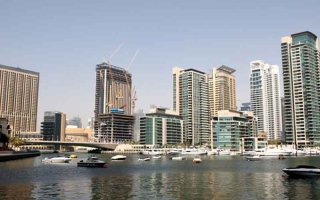- City Fajr Shuruq Duhr Asr Magrib Isha
- Dubai 04:20 05:42 12:28 15:53 19:08 20:30
Twelve unfinished towers in master developments supervised by the Dubai Technology and Media Free Zone Authority (DTMFZA) received the green signal to convert from commercial to either residential, healthcare or hotel in 2011, Emirates 24|7 can reveal.
“[In 2011], we received requests from master developers for changes related to 15 projects. These changes pertain to conversion of commercial buildings into residential, hotel or hotel apartments, or healthcare facilities,” said Mohamed Al Bahri, Executive Director, Zoning Authority Development Control, DTMFZA.
“We have so far approved around 80 per cent of the above number. The remaining requests are still under our review.”
Asked if developers were given any timeline to start and complete construction, Al Bahri stated: “The question of timelines is wholly determined and controlled by the master developer and not by us. As a regulatory body, we work closely with developers and facilitate their requests to re-classify master plans. In doing so, we pay special attention to the re-classification of those projects that have completed structures.
“It makes practical sense that such buildings be brought into operative use with minimal delay. But as such, we do not influence the project timelines.”
DTMFZA is the sole independent regulator of Dubai Technology and Media Free Zone, which includes nine business parks, managed by Tecom Investments. The business parks are Dubai Internet City, Dubai Outsource Zone, Dubai Media City, Dubai Studio City, International Media Production Zone, Dubai Knowledge Village, Dubai International Academic City, DuBiotech and the Energy and Environment Park (Enpark).
Craig Plumb, Head of Research at Jones Lang LaSalle MENA, says the office market in Dubai is currently the most over supplied segment, with vacancies across the city in excess of 40 per cent.
“It is, therefore, welcome news that developers of future (not yet completed) office buildings are seeking to convert their projects to alternative uses such as residential, hotels and healthcare where the level of potential oversupply is less than in the commercial sector.”
He expects to see further examples of both existing and planned projects being converted to other uses next year as the market seeks to adjust to increased oversupply in some sectors/ locations.
“It is clearly easier to revise plans for those projects where construction has not yet commenced rather than those already under construction as there may be structural issues that may be difficult to resolve once construction has commenced.”
According to JLL, as the Dubai market becomes more competitive, older existing buildings and those that are no longer competing well are likely to be either repositioned or converted to alternative uses. A recent example of this trend is the announcement by Al Habtor that they are looking at options for the redevelopment of the Metropolitan Hotel on Sheik Zayed Road.
Mohanad Alwadiya, Managing Director, Harbor Real Estate, says: “The majority of the landlords on Sheikh Zayed Road took the initiative of converting their residential towers or parts of it into commercial towers which were easily rented by companies who were willing to pay any price, and even key money, to get a spot on this VIP business strip during the property boom era.”
Nowadays, and due to the implications of the infamous global economic crisis, the commercial sector is under a lot of pressure as the demand for offices has almost dried up, with most companies implementing cost-saving plans, space optimization strategies and only considering relocation if the new space offers better pricing and payment terms.
“Having said that, most developers and landlords are currently considering to convert their commercial assets into residential assets in order to capture the new market dynamics and demand requirements. This is a natural reaction to avoid the slow demand and high supply expected within the commercial segment.”
The question that presents itself here, he says, is that how easy would it be for these landlords and developers to convert their commercial towers which are either complete or nearing completion into residential or hotel towers.
ALSO READ:
| Dubai property 'investment map' nearly ready  |
![]() Follow Emirates 24|7 on Google News.
Follow Emirates 24|7 on Google News.